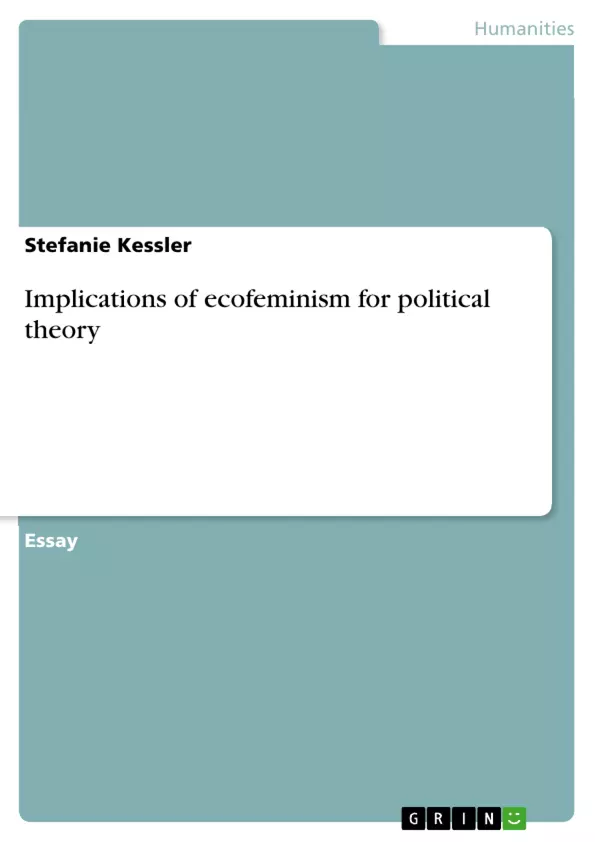Feminism and Environmentalism are both recent phenomens in political theory. They
both challenge mainstream politics as movements and as critical concepts. Thus they
have in common that they are in themselves political and question the establishment.
As concepts they can be applied in political theory to a variation of ideologies and
interrupt the political scene. Andrew Dobson and Robyn Eckersley argue that there is a
rising interest of the mainstream in environmental thoughts as they can contribute to
major political concepts like democracy, justice and others. Herein they see a parallel to
feminist theory which has a major impact on a broad range of aspects in political theory
(Dobson/Eckersley. 2006: 3).
In ecofeminism both concepts merge together. Val Plumwood calls ecofeminism the
'hybrid area' „which aims at developing a feminism that is ecological and an ecology
that is feminist“ (Plumwood. 2006: 51). Thus the question is how both concepts merge
within ecofeminism and how they can contribute to each other and have a larger impact
on political theory in general. As part of this essay I will examine the basic arguments of
ecofeminism and its implications for both concepts as well as on political theory in
general.
I will begin with a definition of the major terms: environmentalism/ecologism, feminism
and ecofeminism. [...]
Table of Contents
- Introduction
- The construction of dualisms in patriarchal society and its ecofeminist critique
- Ecofeminist vision of an alternative society
- Conclusion: Implications for Feminism, Ecologism and Political theory
Objectives and Key Themes
This essay examines the central arguments of ecofeminism, focusing on its critique of the separation between nature and culture. It explores how this critique relates to the broader concept of dissolving dualisms and its implications for political theory.
- The construction of dualisms in patriarchal society
- The ecofeminist critique of these dualisms
- The relationship between ecofeminism, feminism, and environmentalism
- The implications of ecofeminist ideas for political theory
- The potential for an alternative, ecofeminist society
Chapter Summaries
Introduction
This chapter introduces the concepts of feminism, environmentalism/ecologism, and ecofeminism. It discusses how these concepts challenge mainstream politics and how they can be applied within political theory to critique existing structures. The chapter emphasizes the importance of ecofeminism as a "hybrid area" that combines feminist and ecological concerns.
The construction of dualisms in patriarchal society and its ecofeminist critique
This chapter explores the concept of "the Other" as developed by Simone de Beauvoir, arguing that women and nature are constructed as subordinate to men. This construction is rooted in the power dynamics of patriarchal society, which seeks to maintain men's dominance by separating them from women and nature. The chapter explores the ambivalent relationship men have with women and nature, highlighting how men use their power to deny their own mortality and construct themselves as superior.
Frequently Asked Questions
What is the definition of ecofeminism according to the text?
Ecofeminism is described as a 'hybrid area' that aims to develop an ecological feminism and a feminist ecology, merging both movements.
What are the central arguments of ecofeminism explored in this essay?
The essay focuses on the ecofeminist critique of the separation between nature and culture and the construction of dualisms in patriarchal society.
How does patriarchal society construct dualisms?
It constructs women and nature as 'the Other,' placing them in a subordinate position to men to maintain dominance and power dynamics.
What are the implications of ecofeminism for political theory?
Ecofeminism challenges mainstream politics by applying its concepts to ideologies like democracy and justice, interrupting traditional political scenes.
Which theorists are mentioned in relation to ecofeminist thought?
Key figures mentioned include Val Plumwood, Andrew Dobson, Robyn Eckersley, and Simone de Beauvoir.
What is the ecofeminist vision for an alternative society?
The vision involves dissolving oppressive dualisms and creating a society where the relationship between humans and nature is not based on subordination.
- Quote paper
- Stefanie Kessler (Author), 2008, Implications of ecofeminism for political theory, Munich, GRIN Verlag, https://www.hausarbeiten.de/document/116064


